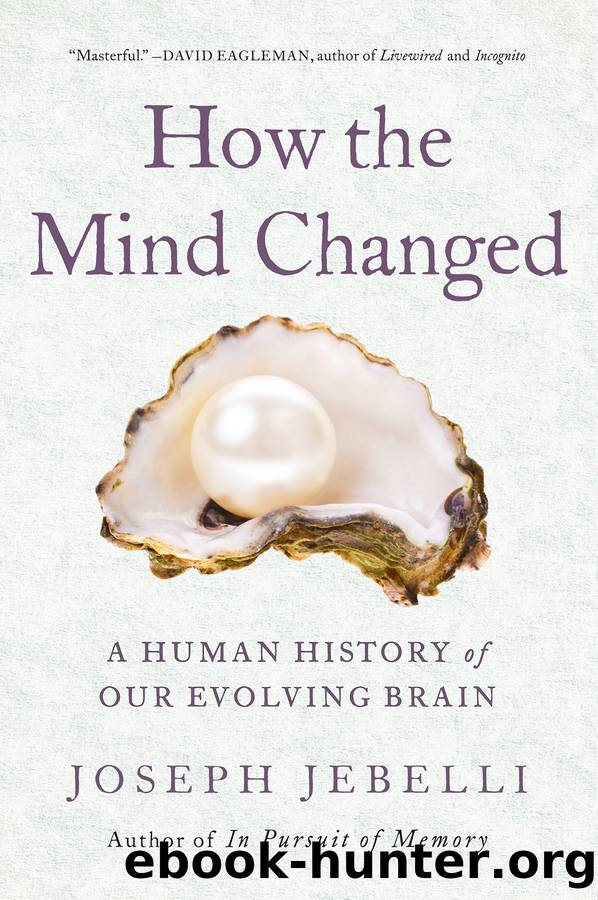How the Mind Changed by Joseph Jebelli

Author:Joseph Jebelli [JEBELLI, JOSEPH]
Language: eng
Format: epub
Publisher: Little, Brown and Company
Published: 2022-07-12T00:00:00+00:00
7
The Illusion of Consciousness
What is it like to be you? To wake up every morning, look at yourself in the mirror, and go about your daily life? What is it like to think all the things you think, to feel all the things you feel? It must be at least somewhat different from being me: whoever you are, you have your own history, your own experiences, your own memories, thoughts and desires. Your own life. Your own sense of being you.
And so we come to arguably the biggest mystery of the human brain: consciousness â our subjective experience of the world and all its perceptual contents, including sights, sounds, thoughts and sensations. A private inner universe that utterly disappears in states such as general anaesthesia or dreamless sleep. And something so mysterious that we still find it notoriously difficult to understand or even define.
Many have tried. In his famous 1974 essay, âWhat is it Like To Be a Bat?â, the American philosopher Thomas Nagel asks us to imagine changing places with a bat. His interest wasnât in bats but in making the point that an organism can only be considered conscious âif and only if there is something that it is like to be that organism â something that it is like for the organism.â1 We could call this the subjective experience of being a bat; a state of being that is comparable to the batâs.
Letâs take Nagel up on his challenge and imagine being a bat. A batâs experience must be starkly different from our own. Most use echolocation to navigate and find food, releasing sound waves from their mouths or noses that bounce off objects and return to their ears, informing them of the objectâs shape, size and location. Some bats glide through the air releasing slow and steady pulses of sound, which then rapidly speed up when they swoop down on their prey. Others calculate their speed relative to their prey using the Doppler effect (the change in sound frequency that happens when the source and/or the receiver are moving; the same reason an ambulance siren sounds differently as it passes). Being a bat, I imagine, would be to live in a shadowy, kaleidoscopic world of sound, instinct and twilight flight.
But is this really what it would be like, or have I simply tried to imagine that I am a bat? If there is in fact something that it is like to be a bat, is it merely a sense of bat subjectivity, or something more? Itâs hard to say.
In the 1990s, the Australian philosopher David Chalmers took things further, proposing a hypothetical entity called the âphilosophical zombieâ: an exact, atom-for-atom duplicate of a human, indistinguishable from a real person in all its behaviour, only with no conscious experience whatsoever. Spooky, right? I envisage such a being to be a bit like Patrick Bateman, the protagonist villain of Bret Easton Ellisâs novel American Psycho, who at one point in the story reveals,
Download
This site does not store any files on its server. We only index and link to content provided by other sites. Please contact the content providers to delete copyright contents if any and email us, we'll remove relevant links or contents immediately.
Spare by Prince Harry The Duke of Sussex(5196)
Navigation and Map Reading by K Andrew(5156)
Tuesdays with Morrie by Mitch Albom(4784)
Machine Learning at Scale with H2O by Gregory Keys | David Whiting(4313)
Cracking the GRE Premium Edition with 6 Practice Tests, 2015 (Graduate School Test Preparation) by Princeton Review(4293)
Never by Ken Follett(3956)
Goodbye Paradise(3810)
What It Really Takes to Get Into Ivy League and Other Highly Selective Colleges by Hughes Chuck(3760)
Fairy Tale by Stephen King(3396)
Harry Potter and the Prisoner of Azkaban (Book 3) by J. K. Rowling(3359)
Pledged by Alexandra Robbins(3178)
Kick Ass in College: Highest Rated "How to Study in College" Book | 77 Ninja Study Skills Tips and Career Strategies | Motivational for College Students: A Guerrilla Guide to College Success by Fox Gunnar(3129)
Reminders of Him: A Novel by Colleen Hoover(3116)
A Dictionary of Sociology by Unknown(3085)
Sapiens and Homo Deus by Yuval Noah Harari(3071)
The Social Psychology of Inequality by Unknown(3030)
Graduate Admissions Essays, Fourth Edition: Write Your Way into the Graduate School of Your Choice (Graduate Admissions Essays: Write Your Way Into the) by Asher Donald(2921)
Will by Will Smith(2919)
Zero to Make by David Lang(2783)
